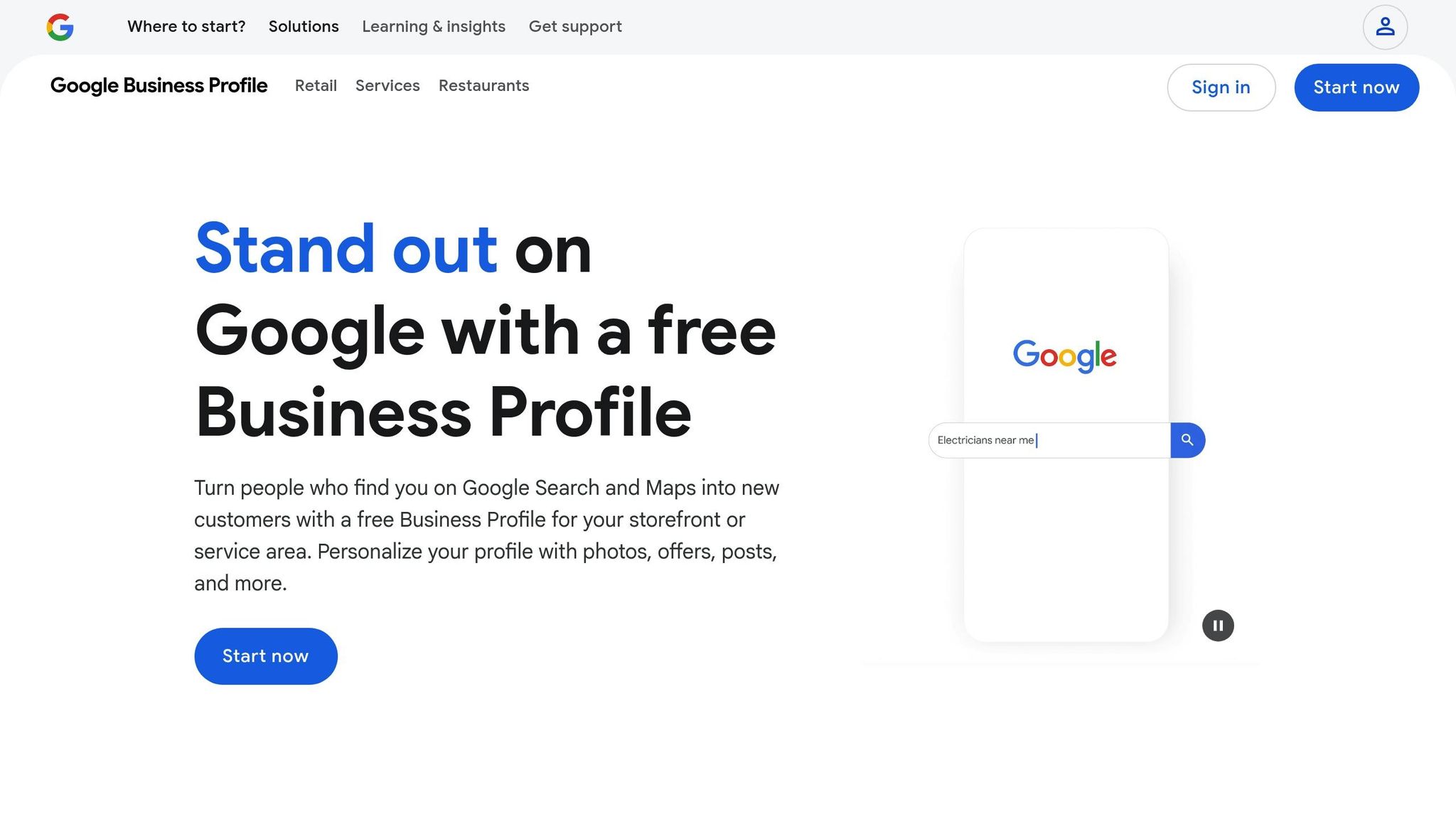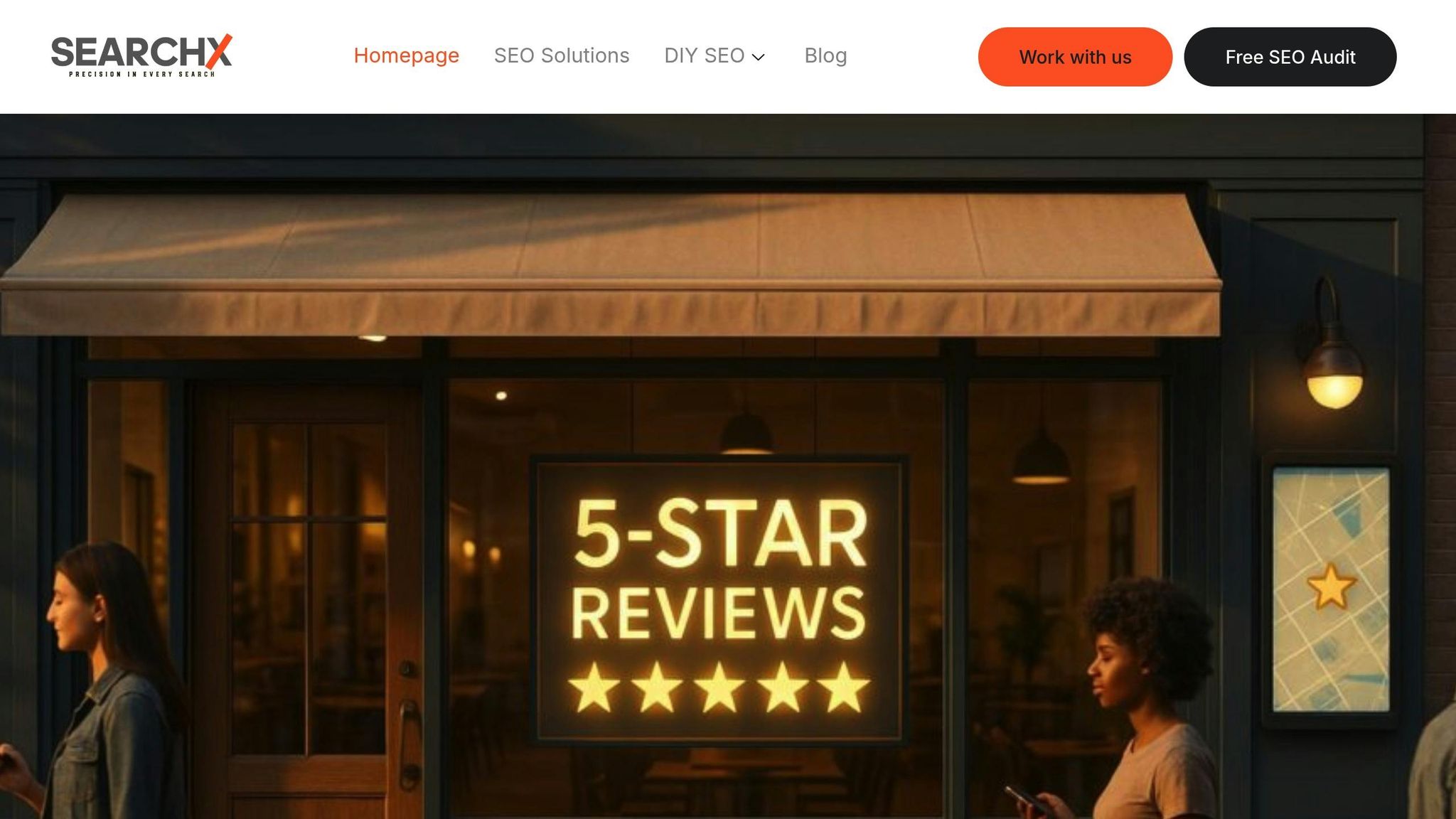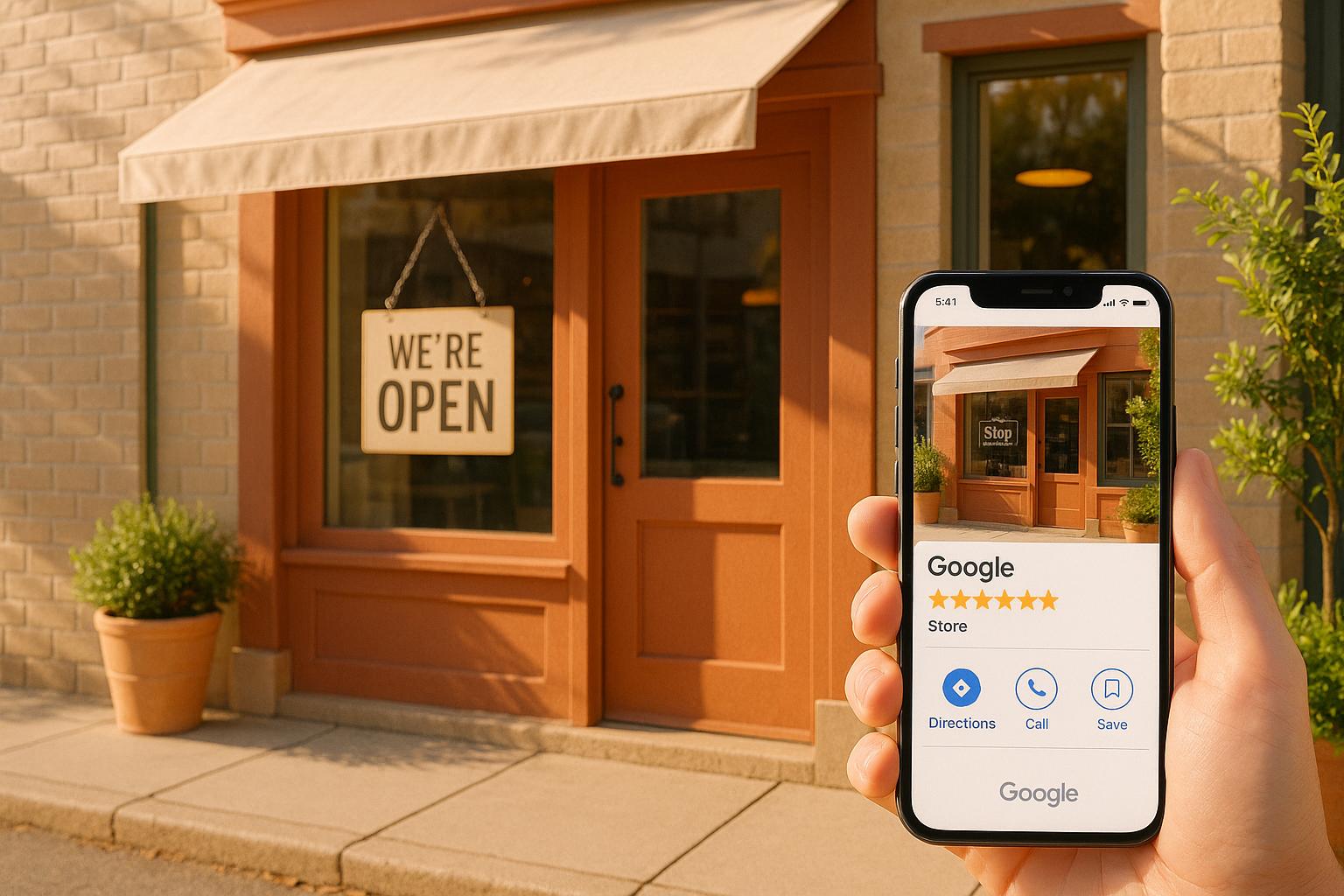If you want your South Carolina business to rank higher in local search results, here’s a quick summary of what you need to do:
- Claim and optimize your Google Business Profile: Add accurate details, photos, and categories.
- Use local keywords: Include city-specific phrases like "Charleston HVAC repair."
- Add location schema markup: Help search engines understand your location info.
- Ensure consistent business details: Your Name, Address, and Phone (NAP) must match across all directories.
- Create locally relevant content: Write about events or services specific to your area.
- Build local backlinks: Partner with local organizations, sponsor events, or collaborate with businesses.
- Encourage and respond to reviews: Positive reviews improve rankings; always reply professionally.
- Make your site mobile-friendly: Over 60% of local searches happen on mobile devices.
- Track your progress: Use tools like Google Analytics and Search Console.
- Stay involved locally: Participate in events and follow state regulations.
These steps help attract local customers, boost your visibility, and grow your revenue. Start by optimizing your Google Business Profile and work through the list consistently.
Local SEO – 10 Point Checklist and Guide
10-Step Checklist for Better Local Rankings
Boosting your South Carolina local search rankings doesn’t have to be complicated. This 10-step guide lays out a clear plan to help your business stand out in local search results.
1. Set Up Your Google Business Profile

Your Google Business Profile is the cornerstone of local SEO. Start by claiming and verifying your profile. Fill in every detail, including accurate hours (don’t forget holidays!), high-quality photos, and service areas if you cover multiple cities.
Choose your business categories carefully. Select the most specific primary category that fits your business, and add relevant secondary categories. For example, a Charleston seafood spot might use "Seafood Restaurant" as the primary category and "Southern Restaurant" as a secondary one to capture more local searches.
2. Research Local Keywords
Find out what South Carolina customers are searching for by using tools like Google Keyword Planner or Semrush.
"Search Engine Optimization in Charleston, SC is all about your business being found locally." – Holy Webs Charleston
Focus on location-specific phrases. Instead of just "HVAC repair", try terms like "Charleston HVAC repair" or "Columbia air conditioning service." These detailed, local keywords often face less competition and can lead to better results.
For deeper insights, services like SearchX can analyze search trends specific to South Carolina, helping you uncover hidden opportunities.
3. Add Location Schema Markup
Schema markup is a game-changer for local SEO. This code helps search engines understand your location details, including your Name, Address, Phone (NAP), business hours, and service areas.
Add LocalBusiness schema to your homepage and contact page. If you serve multiple cities, use the "areaServed" property to highlight each location. Plugins for website builders can simplify this process if coding isn’t your thing. Proper schema markup can even enhance your visibility with rich snippets in search results.
4. Update Local Citations and Directories
Citations – mentions of your business’s NAP – are essential for local SEO. Start with major directories like Google Business Profile, Yelp, and Yellow Pages, then branch out to industry-specific or local directories.
Consistency is critical. If your address is listed as "123 Main St." on Google, make sure it’s the same everywhere else. Even small differences can confuse search engines.
Look into South Carolina directories or associations, like the South Carolina Chamber of Commerce, for more exposure.
5. Write Local Content
Create content that reflects your connection to the area. Write about local events, seasonal services, or topics that matter to your community. This not only improves rankings but also shows you understand your audience.
6. Get Local Backlinks
Backlinks from South Carolina websites can boost your credibility. Reach out to local chambers of commerce, business groups, or community organizations. Sponsoring events or youth sports teams can also earn you mentions and links.
Collaborate with other local businesses for mutual promotion. For instance, a wedding photographer could team up with venues, florists, and caterers to cross-promote services. Local news outlets and blogs are another great way to gain backlinks – offer expert insights or sponsor community events to get noticed.
7. Collect and Reply to Reviews
Reviews influence both rankings and customer decisions. Encourage happy customers to leave reviews through follow-up emails, email signatures, or in-person requests.
Responding to reviews is just as important. Thank customers for positive feedback and address any negative reviews with professionalism. Personal responses show South Carolina locals that you value their opinions.
Encourage reviews across multiple platforms like Google, Yelp, and Facebook to strengthen your online reputation.
8. Make Your Site Mobile-Friendly
With over 60% of local searches happening on mobile, your website needs to perform well on smaller screens. Use Google’s Mobile-Friendly Test to ensure everything – from buttons to text – is easy to navigate. Aim for fast load times, ideally under three seconds.
9. Track Your Performance
Keep tabs on your local SEO efforts using tools like Google Analytics and Google Search Console. Track metrics like local search impressions, click-through rates, and calls from your Google Business Profile.
Set up conversion tracking to see which strategies are driving results. Regularly check your keyword rankings across South Carolina cities and use insights from your Google Business Profile to refine your approach.
10. Keep NAP Information Consistent
Your Name, Address, and Phone number (NAP) must match across all platforms. Consistency reassures Google that your business is legitimate.
Maintain a master NAP document to ensure updates are made everywhere at once. Regularly audit your listings to catch and fix any discrepancies. If you need to make changes, update all platforms simultaneously to avoid confusion.
Tools and Resources for Local SEO Success
Having the right tools can make all the difference in tackling local SEO challenges. For businesses in South Carolina, these resources can simplify the process and drive better results.
SearchX‘s Free GMB Audit Tool

Your Google Business Profile plays a huge role in local SEO success. SearchX offers a free GMB audit tool that provides an instant evaluation of your profile. It generates a detailed report with practical recommendations to enhance your visibility. This tool is particularly helpful for South Carolina businesses aiming to meet local search standards and stand out in their community.
SearchX’s Keyword Research Service
Targeting the right keywords is essential for connecting with local customers. SearchX’s keyword research service specializes in identifying high-impact keywords tailored to the South Carolina market. The service provides a well-rounded list of primary, secondary, and long-tail keywords, making it easier to plan your content and focus on terms that resonate with your audience.
SearchX’s Technical SEO Services
Technical hiccups can hold back your local search rankings. SearchX’s technical SEO services dive deep into your website to uncover issues affecting your performance. The audit looks at key aspects like site speed, mobile responsiveness, schema markup, and citation accuracy. You’ll get a clear, prioritized list of fixes to address these problems and improve your local SEO standing.
These tools – ranging from GMB audits to keyword research and technical SEO support – provide a solid framework for South Carolina businesses to strengthen their online presence and tackle local SEO challenges head-on.
Local Rules and Community Focus
Stick to Local and State Regulations
Make sure you’re following all local, state, and federal laws. For instance, if you’re using SMS marketing, always get proper customer consent. Be transparent by posting a clear privacy policy explaining how you collect and use data. Also, ensure your advertising is truthful and display any necessary licenses to maintain trust.
But compliance is just the start – building a strong community connection can elevate your local presence even further.
Get Involved in Local Events and Initiatives
Participating in community events and supporting local initiatives can do wonders for your business. Sponsoring events or charities not only helps your community but can also lead to backlinks and media coverage. Joining your local Chamber of Commerce is another smart move – it can open doors to networking opportunities and online directory listings that enhance your visibility. These efforts strengthen your ties to the local market and make your business stand out as a trusted, community-focused brand.
Conclusion
A well-organized local SEO checklist is essential for boosting your visibility across South Carolina markets. Whether you’re targeting vibrant hubs like Charleston and Columbia or connecting with smaller communities throughout the Palmetto State, following a clear plan ensures you address the key factors that influence online rankings.
The ten steps outlined here provide a strong starting point – from fine-tuning your Google Business Profile to maintaining consistent NAP (Name, Address, Phone Number) details. Local keyword research allows you to align with the search habits of your South Carolina audience, while adding location-specific schema markup gives you a technical advantage over competitors who overlook these details.
Studies highlight the value of these efforts: businesses that optimize their Google Business Profile and keep NAP information consistent can achieve up to a 70% boost in local search visibility, along with notable increases in website traffic and foot traffic to physical locations. These numbers emphasize how impactful a methodical approach can be.
This checklist isn’t just theoretical – it offers practical steps that deliver real results. Tools like SearchX’s Free GMB Audit and Keyword Research services simplify the process, giving you the insights and support needed to stay on track as you implement each strategy.
Every step you take strengthens your local SEO game. The key is consistent effort and regular monitoring. Start by optimizing your Google Business Profile, then work systematically through the checklist. Use tools like Google Search Console and Analytics to measure improvements in search visibility and customer engagement. Businesses that commit to this structured approach and make use of available resources are well-positioned to see significant gains in local rankings and, ultimately, their bottom line.
FAQs
How can I optimize my Google Business Profile to improve local SEO rankings in South Carolina?
To get the most out of your Google Business Profile for local SEO in South Carolina, start with the basics: double-check that your business name, address, phone number (NAP), and operating hours are accurate and match across your website and any online directories. Consistency here is key. Also, weave in location-specific keywords naturally in your business description and posts to better connect with local audiences.
Keep your profile fresh by regularly adding high-quality photos, engaging posts, and any current promotions. This not only keeps your business relevant but also encourages customer interaction. Speaking of customers, ask them to leave reviews and make it a habit to respond to them – whether they’re glowing or critical. Reviews not only build trust but can also boost your rankings in local searches. Lastly, make sure your NAP details are consistent everywhere online, and don’t forget to sprinkle in those local keywords to stand out in South Carolina’s search results.
How can I build local backlinks to boost my business’s search rankings?
Building backlinks within your local area plays a key role in boosting your business’s visibility in search results. Begin by reaching out to trusted local websites – think community organizations, local directories, or even news platforms. Sharing content tailored to your area, like blog posts about local topics or updates on events, can naturally encourage others to link back to your site.
Another effective approach is to collaborate with nearby businesses, sponsor events in your area, or get involved in community projects. These efforts not only help you gain backlinks but also enhance your reputation and build trust within your community.
Why is it important to keep your business’s name, address, and phone number (NAP) consistent across all platforms for local SEO?
Consistency in your business’s Name, Address, and Phone Number (NAP) is a cornerstone of local SEO. Search engines use this information to confirm your business’s authenticity and deliver accurate search results. If your NAP details are inconsistent, it can create confusion for both search engines and customers, which might hurt your local search rankings.
Keeping your NAP details consistent across your website, social media, and directories not only helps search engines trust your business but also reassures potential customers. This consistency boosts your visibility in local search results and ensures that people can easily find and reach out to your business.




